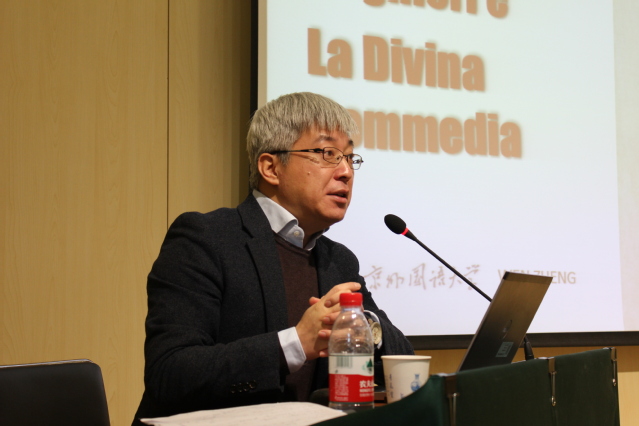
On the morning of December 14, Associate Professor Wen Zheng, the director of the Italian Language Teaching and Research Office, the director of the Italian Research Center, and president of the Chinese Italian Teaching and Research Association of Beijing Foreign Studies University, gave a lecture entitled Dante and Divine Comedy at the College of Foreign Languages. Prof. Yan Guodong, Dean of the College of Foreign Languages, presided over the lecture.
At the beginning of the lecture, Wen Zheng pointed out that Italy was a big cultural country, and then extended to the importance of cultural literacy for language talents, the essence and truth of university education, paving the way for the introduction of Dante and his work Divine Comedy. With rich quotations from domestic and overseas classics, his speech was convincing. The language without culture is an empty shell, and those who had a good understanding of China, the target country, and the entire West and the whole world could develop better. He mentioned that the seven arts in the West and the six arts in ancient China could not be directly transformed into productive forces, but they were the qualities that ancient literati must possess. As Richard Charles Levin, the former president of Yale University, put it, “University education does not teach knowledge and skills, but it can make people competent in any subject or profession.”
Later, Wen Zheng introduced Dante's life and the two main reasons for writing Divine Comedy. His narration was full of fun and fascinating, which aroused the students' great interest in Divine Comedy. Dante and his admired goddess Beatrice only met twice in his whole life. They never spoke to each other, but Dante had written many literary works for her, including New Life and Divine Comedy. Another major reason for the birth of Divine Comedy was that Dante’s political career was frustrated. After Dante was elected as the consul, bloody, too honest and ignorant of the world, he offended a group of politicians and was eventually exiled.
Then, Wen Zheng told the influence of Dante and Divine Comedy in the modern Chinese literary world. As early as 1868, Dante’s name appeared in China, and Dante was mentioned in the works of Liang Qichao, Lu Xun, and Guo Moruo. In addition, Dante wrote the Divine Comedy in Tuscan dialect to promote the birth of Italian. This feat inspired Hu Shi to carry out the vernacular movement. However, he said that China's current research on Dante was still quite shallow, and he had placed great expectations on the study of Dante by students in the Italian major.
Finally, Wen Zheng cited the fifteenth song of Hell as an example to appreciate the literary value of Divine Comedy. In this song, Dante changed his previous metaphors and used his own mouth to express his own ambitions for the first time. He pursued the spiritual perfection and the supreme glory of heaven. The Divine Comedy has a strict structure, which is divided into three parts: Hell, Purgatory, and Heaven. The rhyme is tidy, and more than 14,000 poems are connected with rhymes. The three poems end with the word stelle.
Wen Zheng's lectures are humorous, retractable, and extremely informative, and are deeply loved by teachers and students.
Associate Professor Wen Zheng is also the vice president of the China-Italy Research Association and the judge of the Strega Literature Awards in Italy. He used to be the Chinese Dean of the Confucius Institute at the University of Rome, a special researcher at the China Academy of Art, and a member of the 7th Lu Xun Literature Award (Translation Award). He was awarded the Italian Star Knight Medal by the Italian President.



